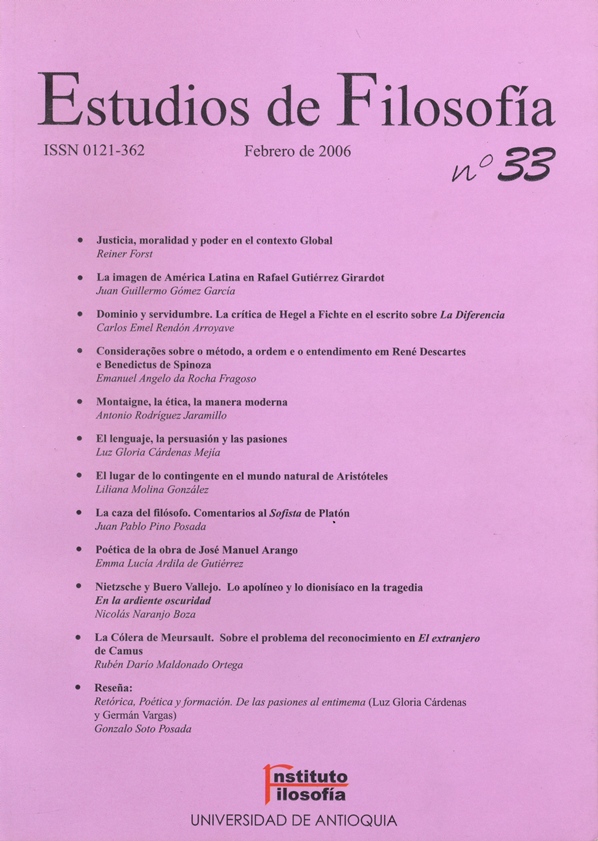Language, persuasion and passions
DOI:
https://doi.org/10.17533/udea.ef.12824Keywords:
Aristotle, language, persuasion, passionsAbstract
Contemporarily, Austin, based on his theories of the acts of speech, established that persuasion It a "perlocutionory" act, if ts an effect, among others, produced by a speaker on another by means of a speech. Aristotle defined Rethorfc as the faculty of considering in each case what is useful to persuade. As the first part of our work points out, persuasion, for Aristotle, is produced through discourse. If this is so, and if passions are also necessary for its production, they must be able to be expressed using language with the intention of demonstrating this, we proceed in the following manner: first, the connection between Persuasion and Opinion, as well as the connection between these with Words, will be dealt with. Second, given the connection aprecision is made that fathermore than the fact that man communicates, something that animals do as well, he also expresses himself through language. And wt will finally make the fallowing consideration.' if by means of the passions changes take place not only in thebody but are felt by the soul, man could also build enunciations that refer to them.
Downloads
References
Bibliografía primaria
Aristóteles. Retórica. Trad. Quintín Racionero. Madrid, Gredos, 1994.
Aristóteles . Acerca del Alma. Trad. Tomás Calvo Martínez. Madrid, Gredos, 1988.
Aristóteles . Investigación sobre los animales. Trad. Julio Fallí Bonet. Madrid, Gredos, 1992
Aristóteles 71-atados de Lógica (Órganon) II. Sobre Interpretación. Trad. Miguel Candel Sanmartín. Madrid, Gredos, 1988.
Aristóteles . Traite de l 'ame. Tomo I. Traduit et annoté para G Rodier. París, Emest Leroux Editeur, 1900.
Aristóteles . Histoire des Animaux. París, Librairie Philosophique J. Vrin, 1987.
Aristóteles . Ética Endemia. Trad. Julio Pallí Bonet. Madrid, Gredos, 1998.
Bibliografía secundaria
Aprés Perelman: Quelles politiques pour es nouvelles rhétoriques? Textes réunis et présentés par Roselyne Korenet Ruth Amossy. Paris, L’Harmattan France, 2002.
Aubenque, P. Le probléme de I'étre chez Aristote. Paris, Pressesz Universitaires de France,
Austin, J. L. Cómo hacer cosas con palabras. Barcelona, Paidós, 1990.
Düring. (1966). Aristóteles. México, Universidad Nacional Autónoma de México, 1990.
Gomperz, Th. Pensadores Griegos. Aristóteles y sus predecesores. Tomo III. Barcelona, Herder, 2000.
Grimaldi, W. Studies in the Philosophy of Aristotle's Rhetoric. Wiesbaden, Franz Steiner Verlang GMBH, 1972.
Hamelin. O. El sistema de Aristóteles. Buenos Aires, Editorial Estuario, 1946.
Heller, A. La teoría de los sentimientos. México, Coyoacán, 1999.
Jaeger, W. (1923). Aristóteles. México, Fondo de Cultura Económica, 1984.
Le Blond, J. M. Logique et Méthode chez Aristote. Paris, Librairie Philosophique J. Vrin, 1996.
Le Breton, D. Las pasiones ordinarias. Antropología de las emociones. Buenos Aires, Nueva Visión, 1998.
Natali, Carlo. “Aristóteles y el renacimiento de la retórica”, en: Logos Revista de Retórica y teoría de la Comunicación. Año II, No. 2, Enero, 2002, pp. 85-100.
Nussbaum, M. L 'intelligenza delle emozioni. Bologna, Societá Editrice il Mulino, 2004.
Nussbaum, M. L .La fragilidad del bien. Fortuna y ética en la tragedia y la filosofía griega. Madrid, Visor, 1995.
Nuyens, F. L 'evolution de la Psychologie d ‘Aristote. Louvain, Éditions de l’Institut Supérieur de Philosophie, 1973.
Perelman, Ch. Olbrechst-Tyteca, L. Tratado de la Argumentación o Sueva retórica. Madrid, Gredos, 1989.
Plantin, C.H. Les raisons des émotions. Disponible en Internet en: http://icar.univ-Iyon2.fr/ membres/cplantin/index.htm
Ronchi, Ronco. La verdad en el espejo. Los presocráticos y el alba de lafilosofía. Madrid, Akal, 1996.
Ross, W.D. (1923). Aristóteles. Buenos Aires, Editorial Charcas, 1981. DOI: https://doi.org/10.7560/707382
Searle, J. Actos de habla. Madrid, Cátedra, Teorema, 2001.
Vargas Guillén Germán; Cárdenas Mejía Luz Gloria. Retórica, poética y formación. De las pasiones al entimema. Bogotá, Universidad Pedagógica Nacional-Universidad de Antioquia, 2005.
Downloads
Published
How to Cite
Issue
Section
Categories
License
Copyright (c) 2006 Luz Gloria Cárdenas Mejía

This work is licensed under a Creative Commons Attribution-NonCommercial-ShareAlike 4.0 International License.
Authors who publish with this journal agree to the following terms:
1. The Author retains copyright in the Work, where the term "Work" shall include all digital objects that may result in subsequent electronic publication or distribution.
2. Upon acceptance of the Work, the author shall grant to the Publisher the right of first publication of the Work.
3. The Author shall grant to the Publisher a nonexclusive perpetual right and license to publish, archive, and make accessible the Work in whole or in part in all forms of media now or hereafter known under a Creative Commons Attribution-NoCommercia-ShareAlike (CC BY-NC-SA 4.0), or its equivalent, which, for the avoidance of doubt, allows others to copy, distribute, and transmit the Work under the following conditions: (a) Attribution: Other users must attribute the Work in the manner specified by the author as indicated on the journal Web site;(b) Noncommercial: Other users (including Publisher) may not use this Work for commercial purposes;
4. The Author is able to enter into separate, additional contractual arrangements for the nonexclusive distribution of the journal's published version of the Work (e.g., post it to an institutional repository or publish it in a book), as long as there is provided in the document an acknowledgement of its initial publication in this journal;
5. Authors are permitted, and Estudios de Filosofía promotes, to post online the preprint manuscript of the Work in institutional repositories or on their Websites prior to and during the submission process, as it can lead to productive exchanges, as well as earlier and greater citation of published work (see The Effect of Open Access). Any such posting made before acceptance and publication of the Work is expected be updated upon publication to include a reference to the Estudios de Filosofía's assigned URL to the Article and its final published version in Estudios de Filosofía.















